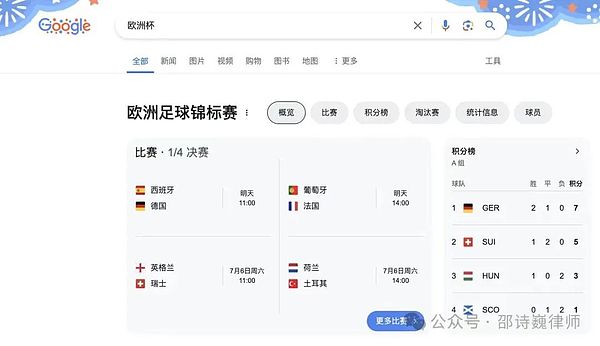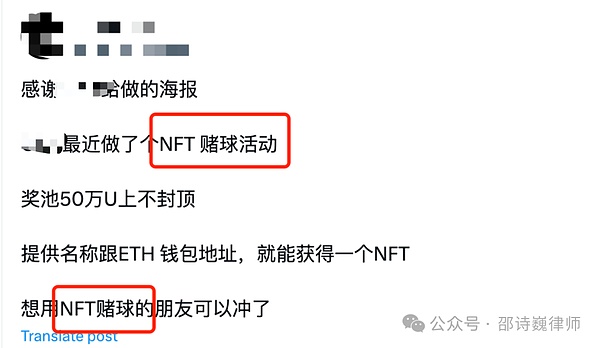Author: Shao Shiwei; Source: Lawyer Liu Honglin
Football is one of the most popular sports in the world, and many important events have attracted hundreds of millions of viewers around the world. The summer of 2024 belongs to the European Cup. As of writing, the European Cup has fast-forwarded to the finals, and the battle is intensifying.

It is worth noting that in recent years, the Web3 industry has frequently sought cooperation with sports IP. While the Web3 platform uses the extensive influence of sports IP to enhance brand awareness, sports IP also uses Web3 technology, such as innovative products such as virtual currency Tokens and NFT digital collections, to open up unprecedented commercial value territory and shape a new model of IP marketing and fan interaction. Common models include issuing fan tokens, NFT competitive activities, and GameFi.
However, while Web3 and sports IP empower each other, legal compliance is also worth noting. Coinciding with the European Cup, many Web3 projects have launched NFT competitive gameplay in conjunction with this sports event. Based on this type of case, this article will conduct a detailed analysis of the key points of legal compliance.
When NFT meets football games
Looking at sports events in recent years, especially football competitions, Lawyer Shao found that the most mainstream gameplays are: NFT x IP joint name and NFT prediction gameplay. In the previous article "When NFT digital collections meet the European Cup, win PFP with a small bet, how about the Whale Exploration European Cup blind box?", similar gameplay of NFT x IP joint name was analyzed.
The other usually manifests itself as predicting the outcome of the game with the help of NFT.
1. Gambling platform
The most common way to use NFT to predict the outcome of a game is obviously the gambling platform. Taking a recently launched Web3 gambling platform as an example, its gameplay is: users participate in daily betting by casting and holding different types of NFT fan cards - the betting amount is determined by the quality and quantity of the NFT fan cards they hold. Users can also increase the daily betting limit and betting amount by upgrading their NFT fans. If you win the bet, the winning user can get the tokens issued by the platform, which can be used for in-game activities or directly exchanged for USDT.
2. NFT Guessing
During the 2022 World Cup, many Web3 platforms launched their own NFT guessing activities. Taking a certain event with a large impact as an example, the core gameplay is that users who participate in the event can mint an NFT of the team they support for free by staking a small amount of ETH (the staking ETH will be returned after the event ends). With the World Cup schedule, supporters of the winning team in each game (team NFT holders) can share the prize pool of the corresponding match provided by the Web3 platform.

Interestingly, the Web3 platform made invitation posters for many KOLs participating in the event to facilitate their promotion. However, some cooperating KOLs directly "backstabbed" and marked this event as "NFT gambling" in the promotion.
Analysis of key points of legal compliance
Web3 gambling projects use NFTs to gamble on football, and their legal compliance issues are obvious. But will the gameplay of NFT guessing activities involve legal compliance issues? This topic is still under discussion. Lawyer Shao analyzed it based on two key points.
1. Does it constitute gambling?
Whether the guessing gameplay combined with real-life sports competitions such as the World Cup and the European Cup held on the Web3 platform involves gambling legal issues (online gambling), it is usually necessary to pay attention to whether the activity itself forms a gambling chain of "paid investment-random gameplay-cash output". If the guessing is based on the results of real sports events, rather than human or system manipulation, then the gameplay of the guessing activity is random. If it also meets the need for users to pay to participate and divide the bonus pool according to the results of the game, then the guessing activity is suspected of "betting on football".
It is worth noting that the "paid investment" here can have many forms, for example:
Users pay to buy NFTs sold by the platform. Of course, if it is a direct sale, it is too simple. In practice, many domestic Web3 game (blockchain game) platforms usually set up a store manager agent model in order to avoid the obvious gambling risks: users cannot directly purchase NFT digital collections on the platform, but can only buy them privately from the "store manager" who cooperates with the platform according to the contact information provided by the platform. In addition, the platform will add another layer of "guarantee": the digital collections in the hands of the store manager are not sold directly to the store manager by the platform, but the platform "gives" the store manager digital collections by selling T-shirts, trophies and other physical objects around the platform.
The platform uses the form of "tickets" as the "threshold" for users to participate in activities. This ticket can be in the form of tokens, cash, NFT or other payment forms; as for the way to obtain tickets, the platform may set users to obtain them directly, or it may set users to obtain them indirectly by participating in other activities.
Although minting NFTs is nominally free, the cost paid by users, in addition to gas fees, there are other fees charged by the platform, such as withdrawal fees, service fees, or other indirect charging methods.
So, according to this definition, does the NFT guessing activity mentioned above involve gambling risks? In this activity, users mint NFTs of their favorite teams for free, and after the game, all the Ethereum pledged by users for minting NFTs will be returned. The gameplay of the activity does not meet the gambling chain, so Lawyer Shao believes that the gameplay does not involve gambling, and it is an activity where the platform throws money for users to play. In contrast, a similar activity launched by another Web3 platform during the 2022 World Cup requires users to complete a contract transaction on the day of the game before they can participate in the guessing and share the rewards.
2. Is it subject to policy restrictions?
Even if the NFT guessing activity does not involve gambling, the Web3 platform must also consider regulatory policies around the world during the operation of the activity. If the issuer of the activity is an overseas Web3 platform and serves foreign users completely, its behavior certainly does not need to be evaluated by Chinese law. However, according to Lawyer Shao's observation, in fact, in many similar activities, domestic users can still log in and participate normally, which violates my country's policy regulations.
On September 24, 2021, the central bank jointly issued the "Notice on Further Preventing and Dealing with the Risks of Virtual Currency Trading Speculation" (hereinafter referred to as the "Notice") with ten departments including the Public Security Bureau, the Procuratorate and the Court for the first time, stating that virtual currency-related business activities are illegal financial activities, and overseas virtual currency exchanges providing services to residents in my country through the Internet are also illegal financial activities.
Of course, the subject regulated by the "Notice" is not limited to exchanges, but defines a very large concept: platforms that operate "virtual currency-related businesses". Therefore, if the Web3 project party whose server is located abroad provides financial services to domestic users, it violates my country's policy regulations.
The 2022 "Initiative on Preventing NFT-Related Financial Risks" also mentioned that "we must resolutely curb the tendency of NFT financialization and securitization, and strictly prevent the risks of illegal financial activities", "do not provide centralized trading (centralized bidding, electronic matching, anonymous trading, market makers, etc.), continuous listing trading, standardized contract trading and other services for NFT transactions, and set up trading venues in violation of regulations in disguise". In some NFT guessing activities, in addition to obtaining NFTs through casting, users can also purchase them in the NFT secondary market, that is, the platform provides a trading venue for NFT transactions.
Written at the end
The combination of Web3 and sports competitive activities has brought a new business model and interactive method to the sports industry. For example, NFT transactions, blockchain games, metaverse viewing and smart contracts, sports and competitive activities can achieve greater commercial value in the Web3 field.
However, while innovating the gameplay of activities, Web3 project parties must also understand the regulatory policies of the countries or regions where their businesses are facing, and conduct compliance assessments of the projects in advance to avoid touching the red line of the law.
 Cheng Yuan
Cheng Yuan







